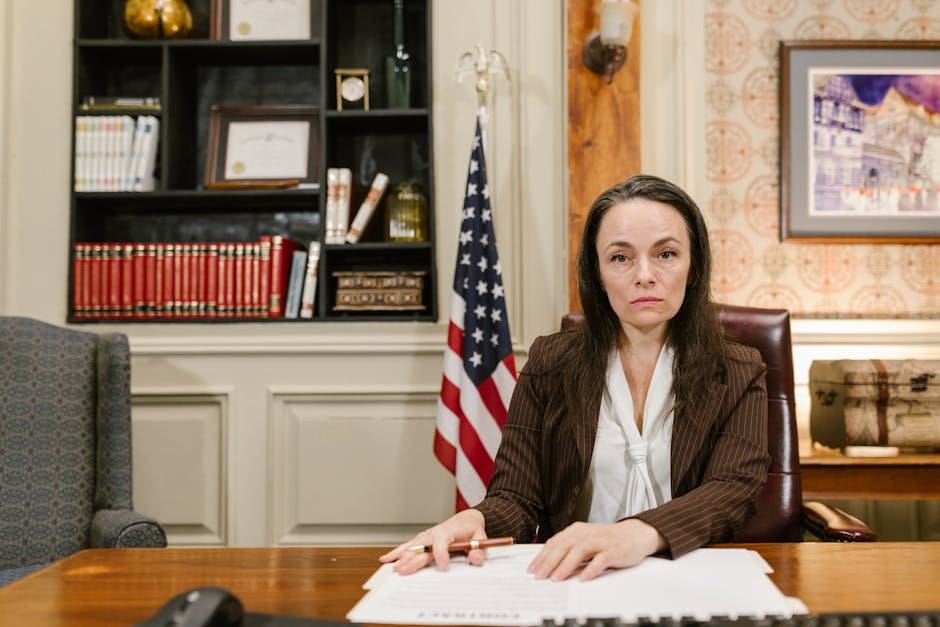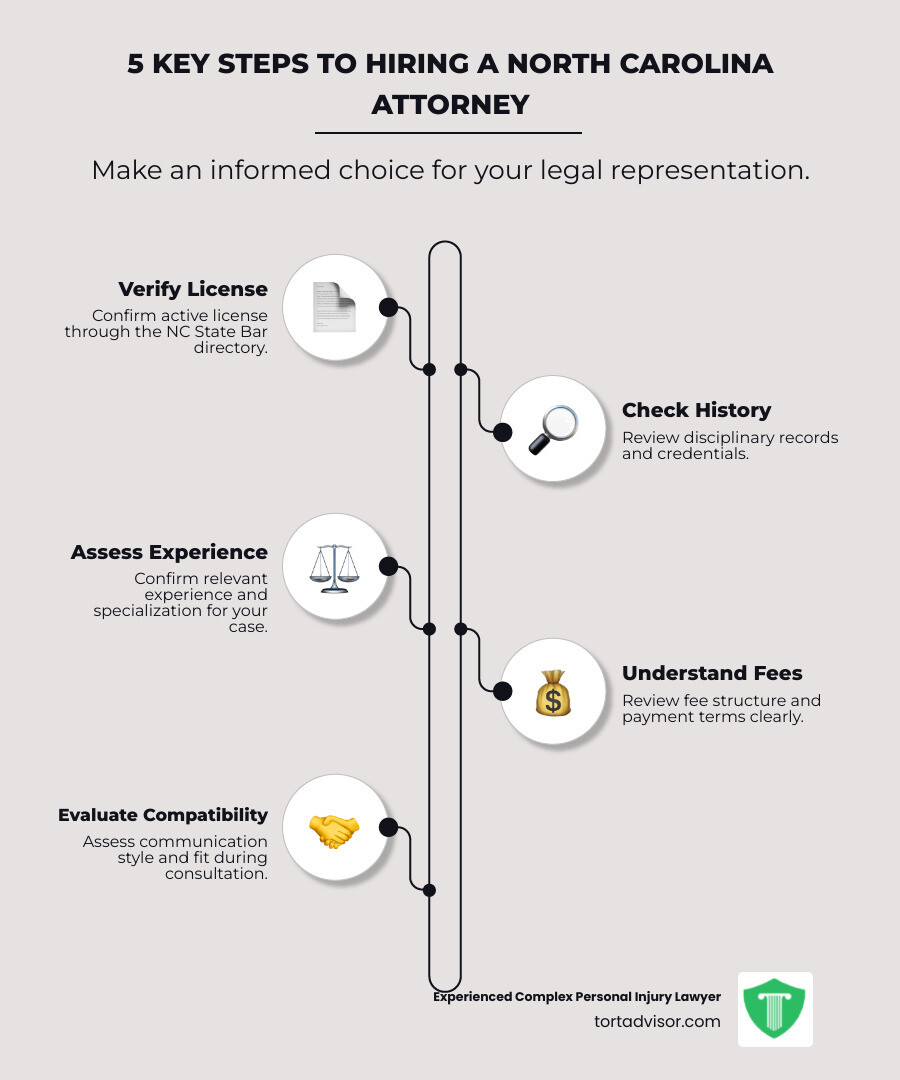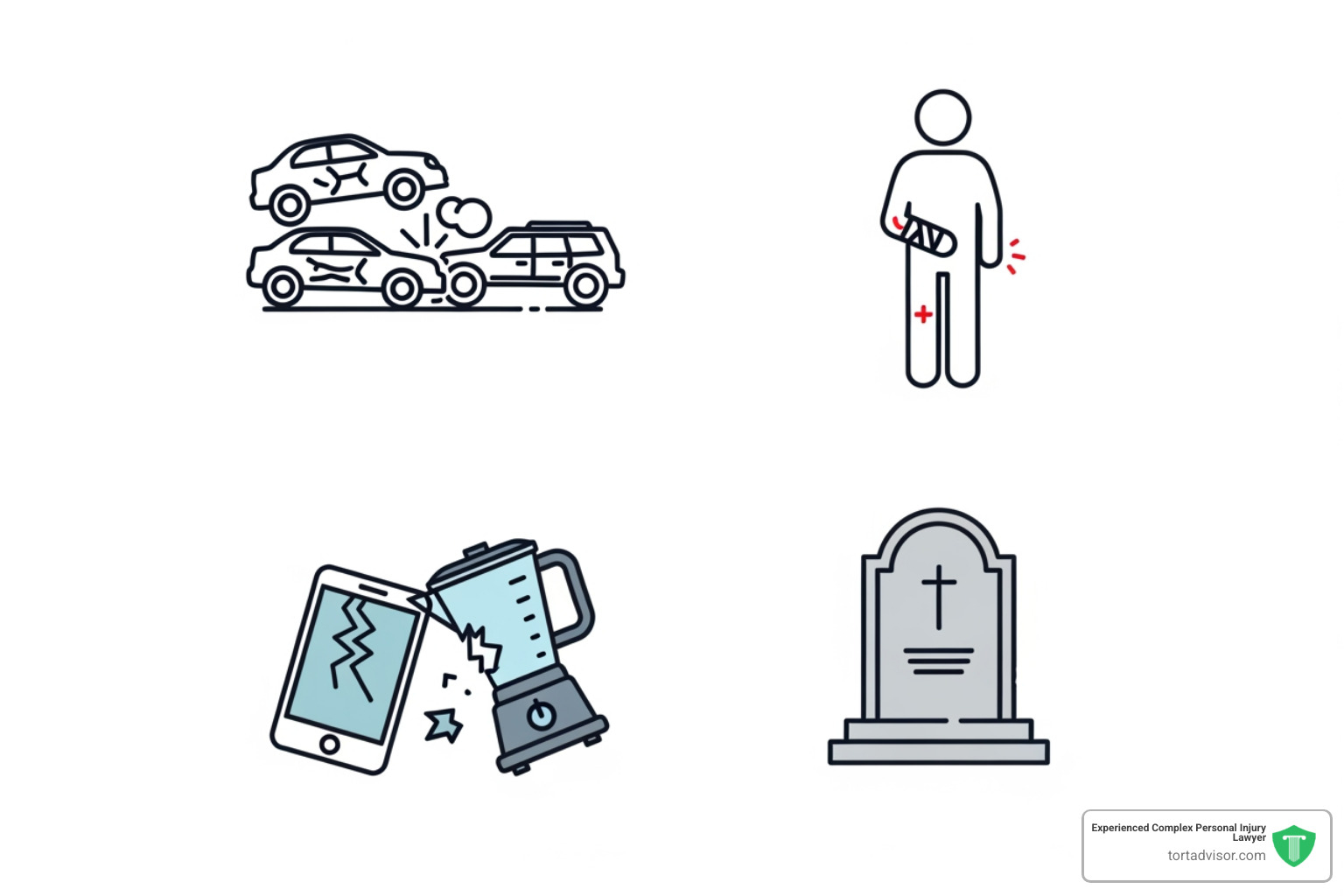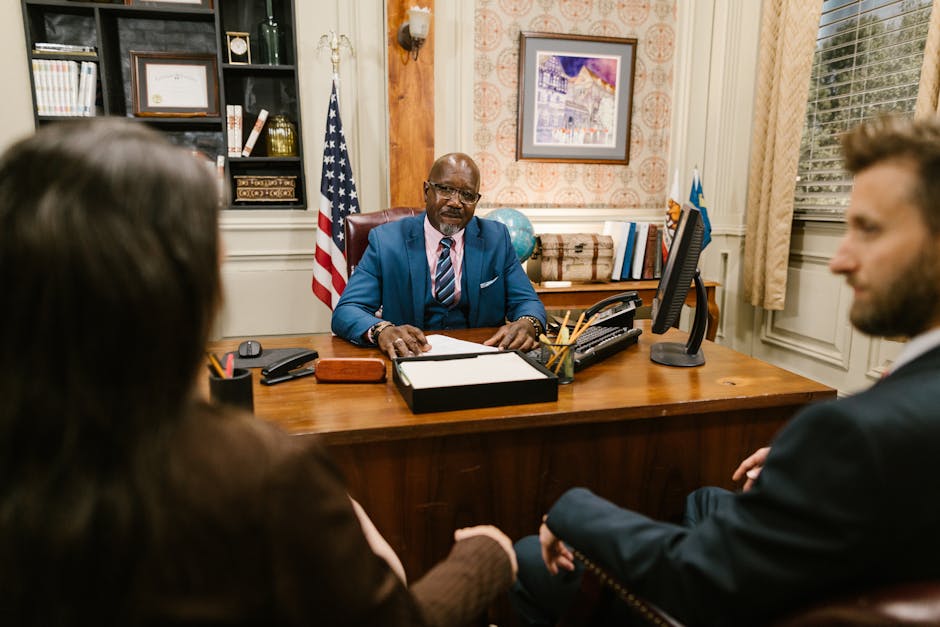


Finding the Right Legal Representation in North Carolina
North Carolina attorney searches typically fall into these categories:
| What You Need | Where to Find It |
|---|---|
| Verify a lawyer’s license | NC State Bar Directory |
| Find a certified specialist | Directory of Legal Specialists |
| Check disciplinary history | NC State Bar Disciplinary Order database |
| Get free/low-cost help | NC Legal Resource Finder |
| Report consumer fraud | NC Attorney General’s Office |
Facing a serious legal matter like a car accident, defective product injury, or wrongful death claim is overwhelming. You’re juggling medical bills and insurance companies while trying to steer a complex legal system. You need an attorney with proven experience, not just promises.
The North Carolina State Bar lists over 30,000 licensed attorneys, but a license alone doesn’t guarantee results. It’s crucial to verify credentials, check disciplinary records, and find a lawyer who specializes in your specific case. Many people skip checking a lawyer’s disciplinary history, a vital step recommended by the NC State Bar.
This guide provides a clear roadmap for finding, vetting, and hiring a qualified attorney in North Carolina. You’ll learn to use official State Bar resources, identify board-certified specialists, and avoid common mistakes.
I’m Mason Arnao. My background in technology has involved building systems to simplify complex information—a skill directly applicable to finding the right North Carolina attorney. This guide compiles official resources to help you make an informed choice.
Common Legal Issues and Attorney Practice Areas in North Carolina
When searching for a North Carolina attorney, understanding the major practice areas is key to finding a true specialist. Most people only seek a lawyer when something goes wrong, and at that point, you need someone with direct experience in your situation, not a generalist.
Personal injury cases are a large part of civil litigation in North Carolina, covering injuries from negligence like car accidents or unsafe properties. Catastrophic injuries, which cause permanent disability, require lawyers skilled in complex medical evidence and future cost calculation. Defective product injuries result from faulty design or manufacturing, while wrongful death claims allow families to seek justice after a fatal act of negligence.
For vehicle collisions, you might search for Car Accident Lawyers Near Me.
Common personal injury practice areas in North Carolina include: car, truck, and motorcycle accidents; workers’ compensation; medical malpractice; slip and fall cases; defective products; nursing home abuse; dog bites; and brain and spinal cord injuries. While attorneys also practice criminal defense, family law, and other fields, a serious injury requires a dedicated personal injury specialist.
Understanding Tort Law and Personal Injury Claims
Tort law is based on a simple principle: if someone’s carelessness injures you, they should be held accountable. This is the core of personal injury law, which usually requires proving negligence.
- Car accidents are the most frequent example. An attorney can help you counter insurance adjusters who aim for low, quick settlements.
- Slip and fall cases involve proving a property owner knew about a hazard and failed to act.
- Medical malpractice claims must show a healthcare provider deviated from the standard of care, causing harm. These complex cases typically require expert medical testimony.
- Defective product injuries occur when faulty products cause harm. These cases often mean facing large corporations, so you need an attorney who isn’t intimidated.
- Wrongful death claims are emotionally taxing cases that seek compensation for a family’s financial and personal losses after a tragedy.
For life-altering injuries, finding a Catastrophic Injury Lawyer Near Me is crucial. These specialists can calculate long-term costs like future medical care and lost earning capacity.
Navigating Complex Personal Injury and Defective Product Cases
Complex cases involving serious injuries or corporate defendants are fundamentally different and require a specialized approach.
These cases demand attorneys skilled in managing extensive evidence, from accident reconstructions to expert witness reports. A seasoned North Carolina attorney understands and counters the tactics insurance companies use to minimize claims, such as questioning injuries or pressuring for a quick settlement.
Proving liability in complex cases often requires testimony from experts like engineers or economists. Maximizing compensation means accounting for all damages, including future medical care, long-term lost income, and lifelong pain and suffering.
At Tort Advisor, we connect clients with attorneys who have the experience and resources to win these challenging cases.
How to Find a Qualified North Carolina Attorney
Finding a qualified North Carolina attorney during a crisis doesn’t have to be overwhelming. With over 30,000 licensed attorneys in the state, a systematic approach is essential to find the right match for your needs.
Start with official State Bar resources to verify credentials. Personal recommendations can be a good starting point, but always verify a lawyer’s standing independently. Online legal directories also allow you to filter by practice area and compare experience levels, helping you create a shortlist of potential candidates.
Using Official North Carolina State Bar Resources
The North Carolina State Bar is your most reliable tool for finding legitimate legal help. As the state’s mandatory licensing and regulatory agency, it maintains the official record of every attorney.
Your search should begin with the North Carolina State Bar directory of licensed lawyers. Here, you can confirm if an attorney holds an active license and is eligible to practice—a critical first step. The directory is searchable by name, city, or other criteria.
While the State Bar cannot recommend specific lawyers, it provides unbiased, official information to help you make an informed choice. An attorney not listed as active and eligible is a major red flag. The State Bar also handles complaints and disciplines attorneys, which protects you as a consumer.
Finding a Board-Certified North Carolina Attorney
For complex cases like catastrophic injuries or product liability claims, consider an attorney with board certification. This voluntary but rigorous process is managed by the North Carolina State Bar Board of Legal Specialization.
A board-certified specialist is formally recognized by the State Bar as an expert, having passed advanced exams and met high standards for experience and peer review. This expertise can be crucial for a successful outcome in a difficult case.
You can find these experts using the Directory of Legal Specialists. While “personal injury” isn’t a formal category, specialists in areas like Civil Trial Law or Workers’ Compensation often handle serious injury cases. Think of it like choosing a medical specialist for a serious condition; the same logic applies to complex legal issues.
Leveraging Professional Organizations and Services
Beyond State Bar resources, other professional organizations and online services can help you find a qualified North Carolina attorney. These platforms often allow you to filter by practice area and location, read client reviews, and compare lawyers’ backgrounds and case histories.
Some services also rely on peer reviews, where lawyers evaluate their colleagues on legal ability and ethical standards. Recognition from peers can be a strong indicator of an attorney’s reputation and skill within the legal community.
At Tort Advisor, we understand the importance of connecting with the right attorney from the start. We work exclusively with top-rated specialty attorneys who have proven track records in personal injury, defective product cases, and other complex tort matters. We’ve done the vetting work so you can focus on your recovery while knowing you’re in capable hands.
Key Criteria for Vetting Your Potential Lawyer
Once you have a list of potential attorneys, the vetting process begins. This isn’t about flashy advertising; it’s about finding a trustworthy advocate with the right experience, clear communication, fair fees, and a clean professional record.
Approach vetting a North Carolina attorney with careful research. You need someone who will fight for you, return your calls, and be transparent about costs. The four pillars of vetting are: relevant experience, clear communication, a transparent fee structure, and a clean disciplinary record. Missing any of these is a significant risk.
How to Check a North Carolina Attorney’s Credentials and Disciplinary History
Checking an attorney’s disciplinary history is free, fast, and essential. The North Carolina State Bar provides public access to this information so you can identify any history of ethical violations.
First, use the NC State Bar Membership Directory to confirm the attorney has an active license and is eligible to practice. An inactive or suspended license is an immediate red flag.
Next, check for disciplinary records. The directory links to any final orders for disciplinary actions, which detail serious professional misconduct. The State Bar’s Disciplinary Order database contains public records of such actions since 1999. The State Bar stresses that this is a crucial step. While a clean record isn’t a guarantee, a history of misconduct is a serious warning sign.
Evaluating Experience, Reputation, and Compatibility
A clean record is just the start. You need a North Carolina attorney with the right experience for your specific case and a compatible working style.
Experience must be relevant. A real estate lawyer isn’t the right choice for a catastrophic injury claim. During your consultation, ask about their history with cases like yours, including outcomes and challenges.
Client testimonials offer insight, but read them critically. Look for patterns in feedback regarding communication and accessibility.
Peer recognition is also a strong indicator of quality. When other lawyers respect an attorney’s work, it speaks volumes about their skill and professionalism.
Your initial consultation is an audition. Be prepared with questions about their strategy, timelines, and communication style. Do they explain concepts clearly and listen to your concerns?
Finally, trust your gut on personality fit. You’ll be working with this person during a stressful time. You need an attorney who is respectful, patient, and responsive.
At Tort Advisor, we pre-screen attorneys for skill and a proven track record. However, we still encourage you to ask these questions to ensure you feel confident in your final choice.
Accessing Legal Assistance: From Low-Cost Options to the Attorney General
The cost of hiring a lawyer is a common concern, but North Carolina offers several pathways to legal help regardless of your financial situation. From low-cost services for civil matters to the Attorney General’s office for consumer protection, resources are available to help you access the justice system.
Finding Free or Low-Cost Legal Help
If you’re concerned about costs, several resources can help you find a North Carolina attorney.
- The North Carolina Legal Resource Finder is an online tool that connects users with free or low-cost legal help for civil matters.
- Legal Aid of North Carolina is a non-profit firm providing free legal services to low-income individuals, though their scope for personal injury cases may be limited.
- Many attorneys perform pro bono work (free legal services). The North Carolina Bar Foundation’s Pro Bono Opportunities can connect you with lawyers willing to take cases at no charge.
- Military personnel and veterans can find specialized help through the LAMP (Legal Assistance for Military Personnel) website.
Importantly, most personal injury attorneys work on a contingency fee basis, meaning they only get paid if you win your case. This makes quality representation accessible to everyone.
The Role of the North Carolina Attorney General
The North Carolina Attorney General’s office, led by Attorney General Jeff Jackson, serves as the state’s chief legal officer, focusing on protecting citizens from fraud and unfair business practices.
The Attorney General’s office does not provide individual legal representation in private cases like personal injury lawsuits. However, they are a powerful resource for consumer protection issues. If you’ve been the victim of a scam or deceptive business practice, you can Submit a Request to the Attorney General. The office investigates these complaints and takes action against offenders.
The office also addresses broader public safety issues, such as fighting the opioid crisis and protecting children from online threats. Think of the Attorney General as a public watchdog. While they won’t be your personal lawyer, their work is vital for consumer protection and public safety.
At Tort Advisor, we connect you with private attorneys for your specific case, while public resources like the Attorney General’s office address other important legal needs in North Carolina.
Frequently Asked Questions about Hiring a North Carolina Attorney
When you’re searching for legal help, you probably have questions—lots of them. That’s completely normal. The legal world has its own language, its own rules, and honestly, it can feel intimidating when you’re already dealing with an injury or legal crisis.
We’ve helped thousands of people connect with qualified attorneys across North Carolina, and we hear the same concerns again and again. Let’s address the most common questions so you can move forward with confidence.
How much does it cost to hire a lawyer in North Carolina?
The cost of hiring a North Carolina attorney varies by case type and billing structure. Common arrangements include:
- Contingency Fees: Standard for personal injury cases. The attorney’s fee is a percentage (typically 25-40%) of the settlement or award, and you pay nothing if you don’t win. This makes legal help accessible when you’re facing medical bills and lost wages.
- Hourly Rates: Common for business, family, or criminal law. Rates can range from $150 to $500+ per hour based on experience and location.
- Flat Fees: A single, fixed price for predictable tasks like drafting a will or handling a traffic ticket.
- Retainers: An upfront payment that the attorney bills against at their hourly rate.
Initial consultations for personal injury cases are often free, but always ask upfront. No matter the structure, ensure you get a clear, written fee agreement that details all costs and responsibilities.
What should I bring to my first meeting with an attorney?
To make your first consultation as productive as possible, come prepared. The more organized you are, the faster a North Carolina attorney can assess your case. Bring the following:
- Relevant Documents: For injury cases, this includes police reports, insurance information, photos/videos of the scene, medical records and bills, and proof of lost wages. For other matters, bring any related contracts, correspondence, or financial statements.
- A Timeline of Events: A simple, chronological list of what happened, including dates, times, and people involved.
- A List of Questions: Ask about their experience with similar cases, communication practices, fee structure, and an assessment of your case’s strengths and weaknesses.
- A Valid ID: For identity verification.
Being prepared allows the attorney to focus on analyzing your case and providing meaningful advice.
What is the difference between the NC Bar Association and the NC State Bar?
It’s easy to confuse these two organizations, but they have very different roles.
- The North Carolina State Bar is the mandatory government agency that regulates the legal profession. Every licensed lawyer must be a member. Its job is to protect the public by licensing attorneys, setting ethical standards, and disciplining lawyers who violate the rules. When you need to verify a North Carolina attorney’s license or check for disciplinary actions, the State Bar is your official source.
- The North Carolina Bar Association (NCBA) is a voluntary professional organization for lawyers. It’s a trade group that provides members with continuing education, networking, and other resources to support their practice. You can learn more at their website: Home – North Carolina Bar Association.
In short: the State Bar is the regulator (watchdog), while the Bar Association is the professional support group (club). For vetting an attorney, the State Bar’s resources are essential.
Conclusion: Making Your Final Decision
After researching candidates using resources like the NC State Bar Directory and the Directory of Legal Specialists, you’re ready to make a decision. Choosing the right North Carolina attorney is about more than credentials; it’s about finding a trusted advocate to fight for you.
Due diligence is your protection. Verifying licenses, checking disciplinary records, and reviewing case histories are essential steps. The State Bar provides the tools—use them to avoid future frustration. Equally important is to trust your gut. During consultations, consider if the attorney listened, communicated clearly, and made you feel respected. You need a partner you can work with during a challenging time.
The right attorney will have specialized experience, a transparent fee structure, and a clean disciplinary record. They will be your guide and your voice.
At Tort Advisor, we simplify this process by connecting you with North Carolina attorneys who have proven track records in complex personal injury and product liability cases. We’ve done the vetting so you can focus on what matters most. If you’re dealing with a defective product, our network includes specialists ready to take on large corporations and fight for the compensation you deserve.
Find a qualified defective product lawyer for your case
Your case deserves a careful, informed choice. Take your time, ask the right questions, and select the attorney who gives you confidence. The right representation can make all the difference.
Free Confidential Case Evaluation
Complete the short form below to get an immediate FREE case review with an expert in your specific claim. Don't wait, your case could be time sensitive to file a claim.
Related Posts
Discover New Jersey disability benefits: TDI, FLI, SSDI, SSI rates, eligibility, applications & appeals for 2025-2026.
Hire a Depo-Provera lawsuit attorney now. Fight Pfizer for meningioma risks from injections. Free consult, MDL updates & settlements up to $1.5M.
Find top Miami florida car accident lawyers after your 305 crash. Get max compensation, navigate no-fault laws & choose the best experts now!
Diagnosed with cancer after Roundup? Learn about the monsanto roundup lawsuits, eligibility criteria, and how to pursue your claim.
Discover how do you qualify for a hair relaxer lawsuit: criteria, diagnoses, evidence & brands in uterine cancer MDL. Claim review now!
Find the best uber sexual assault lawsuit lawyer: expert guides, MDL experience, proven results & nationwide firms for justice.











